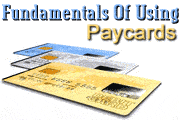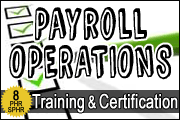Info And Training For Payroll Paycards
How To Use Payroll Paycards
What Are Payroll Pay Cards? Payroll pay cards - aka "payroll debit cards" - are debit cards that enable employers to pay employees through payroll direct deposit - even if the employee does not have a bank account.
According to the American Payroll Association, as much as 10% of the employees in the U.S. are "unbanked" - meaning they don't have a bank account and deal with cash only - and this percentage is considerably higher in certain industries, such as food service, hospitality, agriculture, and construction.
Knowing this, many employers differentiate themselves by offering payroll paycards to attract and retain employees. In fact, according to Patriot Software, there were 5.9 million active pay cards in the U.S. in 2017, and that amount is predicted to reach 8.4 million by 2022.
Benefits To Using Payroll Pay Cards For most employer programs, prepaid debit card programs are free and of little to no cost. Additionally, these prepaid debit cards have no enrollment, no activation, no loading, and no monthly or annual card fees.
Benefits For Employers:- Attract employees who are "unbanked"
- Reduces time and costs for employers on manual checks, lost and stolen checks, stop payment orders, fraudulent cashing of duplicate checks, paycheck production and handling, and bank reconciliation fees
- Enhances efficiency by eliminating paper paychecks and using electronic pay statements
- Increases employee productivity, as less time is spent cashing paychecks
- Reduction of escheat issues
Bottom line, pay cards save employers time and money by providing payments directly through a payroll pay card and not having to print checks. Payroll debit cards for employees also eliminates the manual preparation, printing, and distribution required from your payroll department, letting them focus on other tasks.
Benefits For Employees:- Paycards have no enrollment, activation, or monthly fees
- Eliminates check cashing fees
- Increases independence by eliminating need to ask relatives or friends to cash checks or pay their bills
- Employees cannot take on debt with stored value payroll cards, which may improve their credit status
- Increased safety by obtaining only the cash the employee needs rather than having to cash the entire paycheck
- Easy to use
- Employees are protected from loss because a lost or stolen card can be replaced with its full remaining value
- ATM access means there are virtually no time or geographic limitations on funds access
Additionally, using a paycard can save your unbanked employees time and eliminate the exorbitant fees charged by expensive check-cashing stores and predatory payday lenders.
Recommended Training Course For Payroll Paycards
Featured Course:
Payroll Paycards: How To Save Costs AND Maintain ComplianceMore and more companies are starting to use Payroll Paycards, which is essentially a debit card to which an employee's pay is deposited.
This training session covers the why's, how's, and regulatory issues regarding Paycards. For instance, the majority of state labor laws allow employers to offer direct deposit, but they don't allow employers to mandate that their workers participate in their direct deposit programs.

By attending, you will learn:
- The definition and benefits of utilizing paycards
- The potential downside of using paycards
- The states that have enacted legislation either for or against the use of paycards - and what the legislation states
- Whether or not an employer can mandate the use of paycards for their workforce
- What you do if you are a multi-state employer and you want to launch a program for your entire worker population
- How to roll out a paycard system to your employees if you have decided to initiate a paycard program
More Details / Order:
http://www.PayrollTrainingCenter.com/showWCtDetails.asp?tcid=1000340
Featured Course: Payroll Operations Training & Certification ProgramThe Payroll Operations Training & Certification Program helps beginning and intermediate HR professionals learn the basic payroll requirements.
By taking this course, you will learn how to:
- Maintain accurate payroll records, such as hours worked, pay, and tips and tax amounts
- Track, pay, and report Social Security, Medicare, and Federal Unemployment Tax Act (FUTA) deductions
- Track and process exemptions, fringe benefits, retirement plan deductions, garnishments, levies, and other deductions
- Distribute payments through checks, paycards, and/or direct deposit

- Retain records and forms, such as I-9s and eVerify
- Comply with various wage and hour laws and IRS regulations
- Establish and maintain self-service systems, direct deposits, and paycards
- Select and implement a payroll system
- Develop audit and disaster recovery plans
- Comply with various state and federal record retention requirements
Find Seminars, Webinars, And Online Training In Your Area
More About Payroll Paycards
Legal Issues For Paycard ProgramsWhenever an employer pays an employee there are legal requirements that must be met or at least considered. These requirements depend largely on what state is involved, and include:
- Can employers mandate paycards?
- What is considered timely payment in that state?
- What method of payment does the state allow?
- Does the state have any requirements for escheatment?
- Does the state have a "without discount" requirement when cashing payroll checks or when an employee is paid?
- Does the state have paystub requirements that must be met?
- Does the state have laws to protect employees' right to choose a paycard or a payroll check?
Disadvantages Of Direct DepositDespite its many advantages, direct deposit also has a number of disadvantages that employers should consider before implementing a program. Among these disadvantages are:
- Employers must regularly update the master file of information on direct deposit participants to make sure that terminated employees are not paid in error. This is one reason why companies with high turnover rates may find direct deposit too administratively burdensome
- It is not "paperless". Employers must still process employee authorization forms and prepare the non-negotiable "pay information statements" that employees receive in lieu of their paychecks
- Direct deposit transfers cannot be easily reversed when errors are made
- The employer loses the "float" on payroll funds - i.e., interest earnings for the period between when a check is issued and when it actually is cleared by the employee's bank
- The payroll processing "windows" may be shortened because of the minimum two-day processing time required for a direct deposit. Scheduling for holidays becomes even more complicated because of the shortened processing period
- Some state laws require the employer to absorb bank service charges the employee may incur as a result of the direct deposit program
For more information about payroll paycards, view our
Payroll Operations Training & Certification Program, which is where the information above is excerpted. This course also includes step-by-step strategies on how to set up a paycard program, including how to select a payroll paycard vendor.




